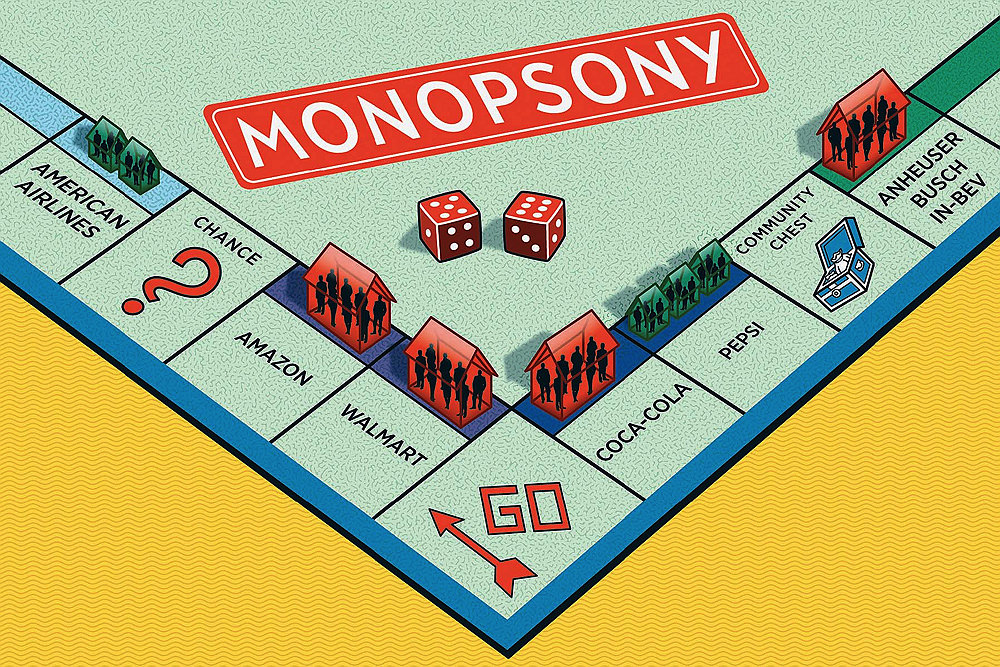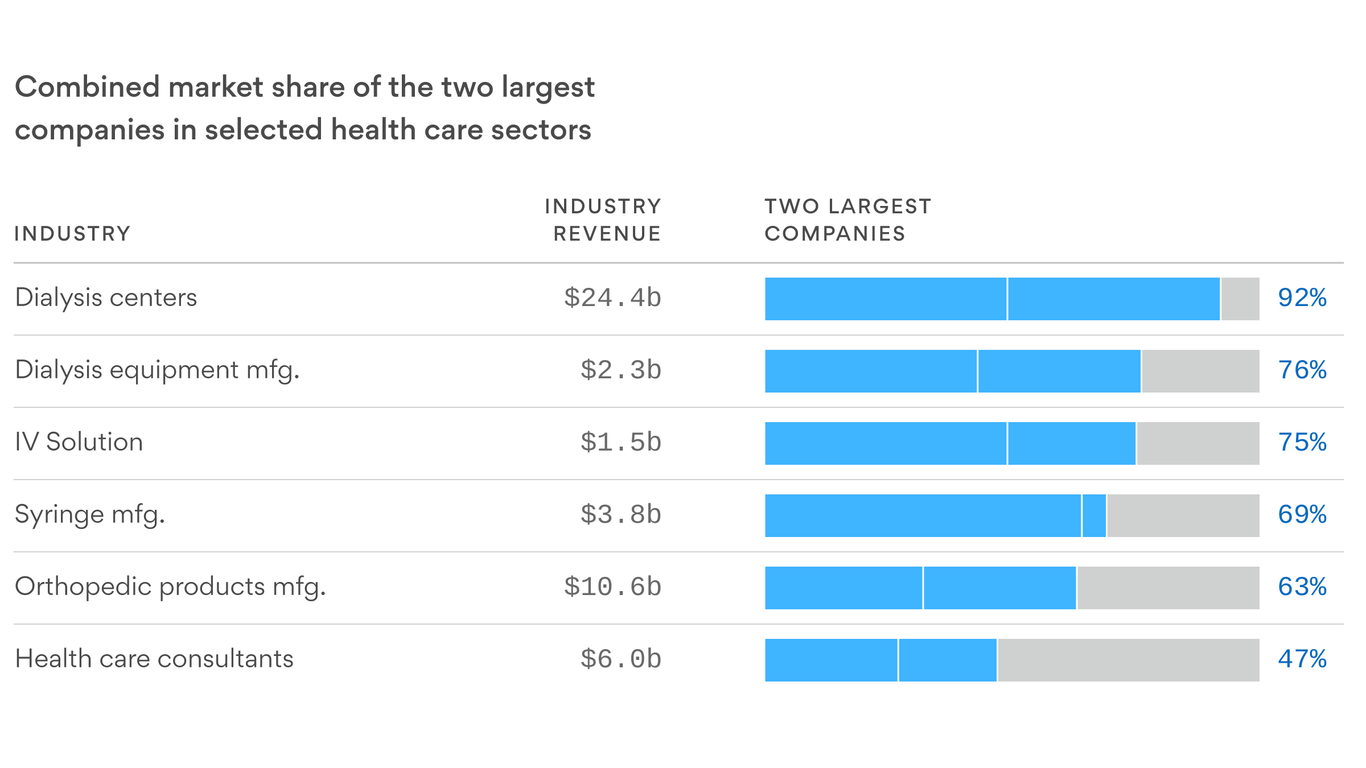Aren't many finance jobs for companies that might have a near monopoly in their industry? What type of medical? It certainly exists in food with huge companies like Mcdonalds. Bars? Is that a big employer?What service jobs aren't tied to some industry?There are few industries I can think of that don't have some form of this. The use of noncompete agreements is all over.Good question. I would say you want to first start by following the money. The wealth is here, we have plenty of jobs, where is the money going? I think we know the answer to that. So then why are markets so broken? Here is a good article I mostly agree with you should read.Yes something is wrong. Has nothing to do with trade. We have near monopolies, wage collusion, government corruption... internal problems have hurt the market.What do you base that on. Again, tons of wealth and jobs. That’s the formula for good wages. If we had too much inflow we’d have high unemployment and certainly wouldn’t have labor shortages. Your claim is baseless. Learn some economics.That is an internal problem . We have the wealth and jobs. That wouldn’t change if we were isolated.We have the biggest economy in the world with the most wealth and we’ve had super low unemployment. Seems to be fine.Being isolated is bad for capitalism. Very bad .How do you mean? The USSR failed miserably. Pretty big country.Isolated countries fail economically.I'm 100% for it. Regardless we have to continue exports to maintain our status as world power, otherwise we'd give that status to China. If countries were to become isolated, then yes, no country would complete with the USA, we'd be set.
I think we should also end foreigners owning U.S. real estate. That said millennial's already screwed the pooch on that one. Many figured they were above property ownership. They didn't take into account they'll be paying the Chinese rent in the form of 5Kish by their 60th B-days.
To be fair, there has never been an isolated country on a scale of the US.
AND, as we seen to be destined to be fucked by any trading partner, isolation could be a competitive policy.
THe choice seems to be either be the world's bitch, or take our ball and go home.
Failed because they tried to have a big empire AND we fought them.
Not because they were isolated.
Being the world's bitch on trade, hasn't been that great either.
If only there was a third option. But there does not seem to be one.
No, we're not. Our middle class wages have stagnated and our middle class and lower class have lost faith in the future.
People are dying from this shit. To the point that our life expectancy is actually FALLING.
Good macro economic numbers have been hiding generations of pain.
Try to change policy.
It is not an internal problem. It is a problem caused by external trade and the inflow of labor.
Time to change policy.
Because we have NOT had rising wages for the middle class and working poor.
If it is the formula for "good wages" something went wrong.
How do you know which factors are causing the issue? Cause the reduction of demand, by losing so many manufacturing jobs, while flooding the labor market, seems, like two factors that could have quite an impact.

Wage stagnation: economists look to new explanations | Harvard Magazine
Economists look to new explanations for wage stagnation.harvardmagazine.com
MARKET CONCENTRATION, the economist’s term for how much an industry is dominated by one or a few firms, touches ever more aspects of American life. From the obvious (the Amazons and Walmarts of the retail economy) to the obscure (the beer industry, which may appear diverse, is dominated by two firms), market concentration has increased in three-quarters of U.S. industries during the twenty-first century. This has had wide-ranging effects not only on consumers, but also, economists increasingly believe, on labor. “Fewer firms in a given industry makes it easier for them to have more bargaining power [over employees], and harder for workers to switch to another employer,” says Jason Furman, professor of the practice of economic policy at the Harvard Kennedy School, and former chair of the Obama administration’s Council of Economic Advisers.
Today’s labor markets increasingly look like a monopsony: a market in which there is only one buyer—the inverse of a monopoly, in which there is only one seller. The more an industry is dominated by a small number of corporations, the more those companies can control the cost of labor. Traditionally, Furman says, economists have relied on a supply-and-demand story about the labor market: “There’s a supply of workers and demand for workers, and the wage is what clears the market, just like the price of wheat is what clears the market for wheat. That explains a lot about wages, but it probably doesn’t explain everything…[T]hat research program went as far as it could.”
In the last three years, Furman explains, economists have looked to monopsony and other factors beyond market competition to explain the stagnation of Americans’ wages during the last few decades. Fewer companies in a given industry make it easier for those companies to coordinate, either indirectly or through overt collusion, to keep wages low. Think of a town with two big-box retail stores: each store knows what the other pays its cashiers, and neither wants to raise wages. Firms can also use noncompete agreements, which ban employees from taking jobs at rival companies, to prevent workers from finding new jobs elsewhere. About 24.5 percent of the American work force has signed a noncompete, according to one Brookings Institution analysis, and this number is not much lower (about 21 percent) for workers earning less than the median salary.
But wages stagnation is across the board, not limited to "given industries".
Why are you limiting the discussion to industries? Nothing prevents labor from moving from industry to service jobs.
Financial, Medical, Food, Bars, off the top of my head.
1. Not that I have seen.
2. All types of medical. I've seen a steel worker retrain as radiation therapist.
3. Bars are huge employers. And owning a bar can be quite lucrative. I have seen a retired steel worker become a millionaire opening a bar.
